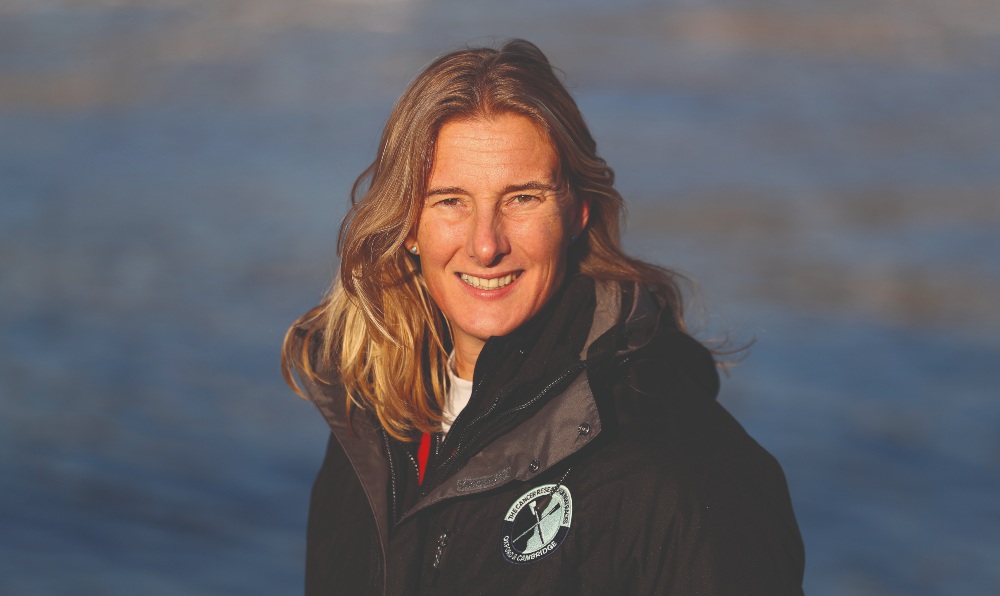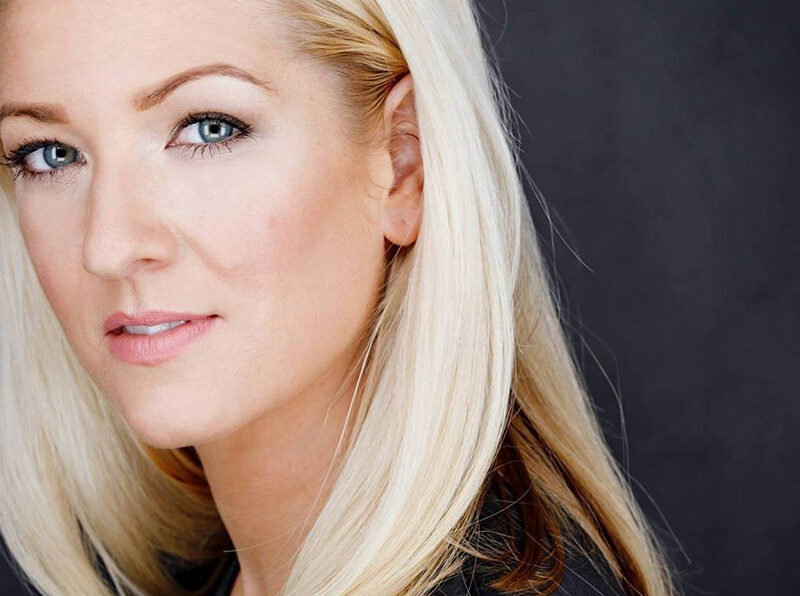
Sarah Winckless: A Race Against Time
Sarah Winckless: A Race Against Time
We talk to Sarah Winckless, umpire of the 2020 men’s Boat Race, about what drives her
This year, for the first time in the 166-yearhistory of the men’s Boat Race, the head umpire clutching a flag and shouting instructions into a megaphone will not be a man but a woman. A three times veteran of the women’s Boat Race and Olympic medallist, Sarah Winckless, MBE, has already packed some incredible achievements into her career. Who better to break into one of the oldest, poshest and most bloke-ish events on the social calendar, and notch up another first for womankind?
I ask if the Boat Race organisation has designed a special uniform for her, but Winckless laughs and tells me that standing at the front of the race officials’ boat her only fashion priority will be staying warm and dry. She will be swaddled in layers of wetweather gear, to ward off the March wind and the spray from the boats.
“We get an umpire jacket with the race sponsor’s name on it. Wearing a lifejacket, that’s absolutely key, as I won’t be able to umpire the race if I’m down talking with the fishes.”
As she trains her gaze on the two straining crews in their spindly boats slashing through the choppy, grey water, Winckless will be remembering rowing in her own first Boat Race, 25 years ago. She was incredibly nervous before the start. “All I could do was think about breathing out, because that was what I had been told to do by Judy Swann, my inspirational PE teacher at Tiffin Girls School. So when I got really nervous I would just do these long breaths out – which I now realise were also changing my physiology and bringing down that nervous anxiety, so it was a brilliant piece of advice.”
Winckless showed athletic ability from an early age, as a junior international discus thrower and as a netball player. The Tiffin Girls netball team coached by Judy won the U16 national championships. Winckless has fond memories of playing basketball at Tolworth Rec and of athletics with Epsom & Ewell Harriers. But after her GCSEs her family sent her away to board at the specialist sports school Millfield in Somerset, partly so that her talents could be nurtured, but partly to shield her from the environment at home.
Speaking about this is difficult for Winckless, and her normally cheerful voice becomes bleaker. “Part of the reason I went to Millfield was because life at home was quite chaotic. My mum had Huntington’s disease – she died this year – and for 30 odd years we as a family supported her as she declined into the ravages of the disease. The first part of the disease was losing the grace of her movement, and her mood became unpredictable, which made home quite tricky. So Millfield gave me that time and space to focus.”
Winckless got into Cambridge, and gained Blues in netball and athletics. Although her father, Robin Winckless, and stepdad, Mark Hart (a 1976 Olympic silver medallist in double sculls), had both rowed, she had never meant to follow suit; but rowing came looking for her. Sitting in the noisy dining hall in her first term at Fitzwilliam College, she was accosted by captain of boats Mike Roberts, who pointed to her height (she stands a towering 6ft 3ins). “He was intent to get me in a boat. He came up to me and said: ‘Sarah, come on. You have to come and row. Look at you.’”
So when the following summer she failed to be selected for the Commonwealth Games for discus, Winckless went along to Cambridge University Women’s Boat Club training camp instead. Less than a year later, she was rowing in the first of her three women’s Boat Races. Against all odds, because Cambridge were the underdogs, they rowed out of their socks and won. It was the turning point in Winckless’s sporting career.
“We just had an amazing race, that’s why we all have such an amazing relationship now,” she remembers. “It was the most incredible feeling to win as part of a strong crew. It was something I had not experienced when I was competing on my own. It got me addicted to rowing.”
Back in the Natural Sciences lecture hall, as Winckless listened to psychology lectures about the effects of brain damage, she had a much darker Eureka moment. “It became really clear to me that the behaviour change in Mum was something changing in her brain, it was not coming from choice. You see, when we were growing up it was just Mum, we didn’t know about Huntington’s, it was just that she wasn’t happy or we weren’t able to keep her satisfied.
“Then she got diagnosed with Huntington’s that year. It was actually a relief, because I could understand what was going on. Of course with her diagnosis, each of us children was at 50:50 risk of having inherited the disease. Being in Cambridge, I was able to go down to the brain repair unit, and Ann Kershaw, the genetic counsellor, worked with me. She had to tell me the news that I had inherited the gene.” There is a long silence in our conversation at this point, as Winckless (who campaigns for the Huntington’s community, and has told this story many times before) waits for me to understand. People with the Huntington’s gene always go on to develop the disease, usually between the age of 30 and 50. Winckless is 46. Symptoms usually start with mood changes and loss of co-ordination. It’s irreversible and eventually fatal – a terrifying prospect for anyone, particularly an elite athlete. Her three siblings did not inherit the gene, something that Winckless has described as a “good result” – which tells you a lot about the positive way she has faced her own diagnosis. But what a bombshell to get in your university finals year.
I ask if the diagnosis has affected the way she has lived. Winckless’s reply is devoid of self pity. “Maybe it’s for me the gift that I have been able to live life slightly differently,” she says. “Certainly my expectation, in the 20 years between knowing and age 40, had been that the second part of my life, the last part, would be truncated and managing the illness… Maybe it has given me freedom to live fast, and learn lots, and take a riskier path. My path has not been a normal one.”
She had an email recently from Ann Kershaw, now retired, congratulating her on still being well.
Winckless’s quest to get to the top of her new sport was relentlessly driven. She joined the GB rowing squad, stuffing envelopes at a marketing company in Twickenham to pay her way. She ended up working there for 10 years, as lottery funding for sport was in its infancy. To improve their skills, the coach had them practising on the water from first light to sunset, followed by twilight sessions in the gym. One winter the river froze, and they drove to Putney before dawn to find open water to train.
After repeated injuries Winckless retired from competition in 2009, but stayed at the top of her sport, breaking the glass ceiling repeatedly – for example, being appointed the first female chair of the British Olympic Association’s athletes commission during the London 2012 Olympics. In 2016 Sir Steve Redgrave appointed her the first female umpire of Henley Royal Regatta. She has umpired the women’s Boat Race and the reserve team races, but the big public breakthrough comes on March 29, when she steps onto the Eco Cat race boat to umpire the men’s Boat Race.
Winckless does not gush about the significance.
“I’m delighted that the umpires’ panel has worked, and we’ve created trust in men and women umpires for the Boat Race,” she says levelly. “I think it is a symbol of our times, things are shifting. If I’m being controversial, my concern is that we’re getting more women into the system, but are we getting enough real diversity? There’s still work to do.”
No wonder she has packed so much into her career already, and appears in a hurry to do more. “It’s about doing as much as I can while I still can, and hoping the scientists find a way to fix it. I want to make the most of my time.”






